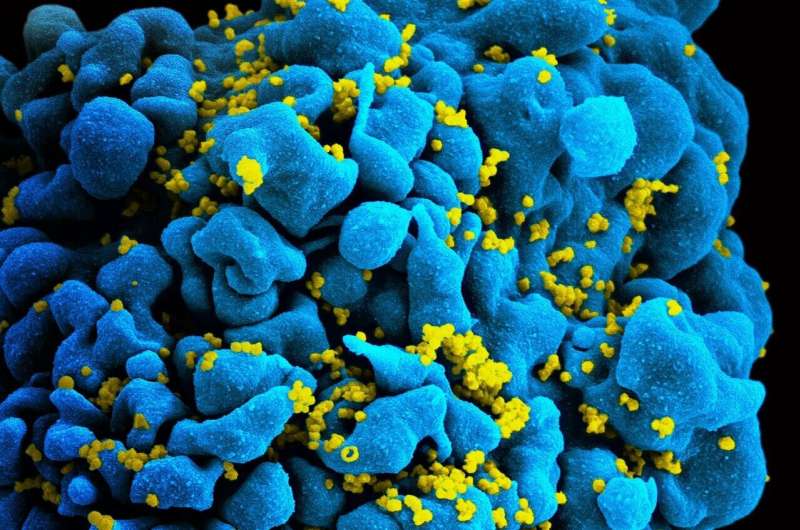No new HIV cases by 2030? Advocates in Chicago applaud Trump's goal but question how it will be carried out.

After state and national leaders announced efforts to eliminate the spread of HIV over the next decade, those involved in prevention efforts in Chicago applauded the plan but questioned how it would be carried out, particularly when it comes to reaching those who are disproportionately affected by the disease.
Days after Illinois Gov. J.B. Pritzker signed an executive order that re-establishes funding for HIV prevention and treatment programs, federal health officials announced an endeavor they say could slash new HIV diagnoses nationally by 90 percent by the year 2030. The U.S. Department of Health and Human Services plan—mentioned by President Donald Trump in Tuesday night's State of the Union address—calls for increased funding for existing treatment programs and the creation of a new program to provide medicine to high-risk communities.
The federal plan targets "geographic hot spots" across the country that accounted for about half of all new HIV diagnoses in 2017.
Cook County is among the designated hot spots, and those on the front lines of HIV prevention and treatment in Chicago say they share the Trump administration's goal, which they call a realistic one. But some question if and how the plan will be implemented, given the administration's track record on other public health issues, and say challenges remain in reaching at-risk communities, including gay and bisexual men of color, and low-income populations without access to health care.
"We actually do have the tools currently to eliminate infections ... through the incredible amount of scientific development we've seen in the last 15 years," said David Ernesto Munar, president and CEO at Howard Brown Health, a health center that, in part, specializes in HIV treatment and prevention. "Though there's not a cure, there are very powerful medications ... that can really render HIV as a chronic, manageable condition."
But Munar said he's discouraged by the Trump administration's efforts in the past two years to scale back parts of the Affordable Care Act and cut funding to social service programs.
Combating HIV "requires targeted funding, access to health care, access to these medications, and a social safety net," he said. "It doesn't mean it won't happen; we're so glad the commitment is there," Munar added. "But we really need to see the backup."
Although HHS Secretary Alex Azar released a lengthy statement Tuesday calling for funding of the national plan, he did not say how much money would be allocated. Dr. Robert Redfield, director of the Centers for Disease Control and Prevention, released a statement Wednesday pledging to form HIV elimination teams for "boots on the ground support" for state and local health departments in those communities vulnerable to HIV.
In addition to medications that treat those already infected—providing them with a "normal life span" and reducing their chances of spreading the virus—Munar said there is also a drug that can prevent those who are not infected from contracting HIV, Munar said.
Part of the challenge lies not only in the cost of medication, but also in awareness of HIV testing and treatment as a whole, including a newer, preventive drug Pre-exposure prophylaxis, known as PrEP, and marketed as Truvada. "There's about 70,000 Americans on PrEP right now, but probably a million could be," Munar said.
"We need to be making sure we're reaching out to the populations who are most at risk," Munar added. "The challenges are for some folks who are marginalized, this is fourth or sixth on their list of needs. Housing and economic security are first and second."
Munar said he's optimistic about the state's "Getting to Zero" plan, which aims to have fewer than 100 new HIV cases in Illinois per year by 2030 through testing and treatment at state and local health departments and other community health providers. But he also questions if enough funding will be available, given the state's constant fiscal woes.
Brian Mustanski, director of the Institute for Sexual and Gender Minority Health and Wellbeing at Northwestern University Feinberg School of Medicine, said there's a need for better understanding of how to provide treatment access to young, gay and bisexual men of color, who are disproportionately affected by HIV.
In addition to targeting geographic hot spots, he said, prevention efforts also have to focus on "demographic hot spots."
Mustanski said his research has shown that it's not that young gay and bisexual men of color engage in risky behaviors. Instead, it's an issue of access to health care and medication, and awareness.
Any successful plan will need to target this group with comprehensive sex-education programs, along with the funds to carry it out, Mustanski said. And researchers must continue to look for ways to reach at-risk communities.
"There are particular communities that are severely and disproportionately impacted by HIV," he said. "If we're going to get to zero, we're going to have to address it in Cook County."
©2019 Chicago Tribune
Distributed by Tribune Content Agency, LLC.


















